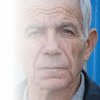In May I autopsied a man I had gotten to know. He came to the autopsy table more rapidly than usual after he died, because the autopsy was for cancer research. Joseph (yes, not his real name) was a “tumor donor.” Tumor chemistry is unforgiving and ephemeral — the mysteries fly away unchasable unless the tissue is dropped into a test-tube and frozen right away. We move quickly with these cases.
And yet, in the struggle of end-of-life family logistics, it took weeks till I met Joseph. I worried constantly that our difficulty organizing the family meeting would mean that death would intervene before we could make arrangements. We had to be patient, knowing the arms on the end-of-life clock were were swinging and shaking forward erratically and unpredictably.
My first contact with Joseph was by phone. Raspy, gruff conviction and the choppy conversation of a man with difficulty hearing greeted me.
“Yes, I want to donate my tumor! What the hell do I need it for?! I’m not taking it with me!”
Joseph was direct, pointed, and at ease with the process of Tumor Donation. Part of his motivation, I learned later, was that Joseph had received a living organ donation some years prior. He was living — had gotten to stay alive — because someone else had given a part of themselves to Joseph. Now dying of cancer, he wanted and was ready to give his own tissue – “give back” or, in more Joseph-language, a “take-it-the-hell-out-of-me” gift. His gruffness made it all the more moving to see this man — filled with incessant, growing tumor — deciding to donate that tissue for research. My experience with Joseph was not the soft and painful poetry of cancer introspection, but the hardness of a good, working man armed with a cause.
When we met, Joseph was garrulous and eager; clear and open to the discussion. I wondered not only what it would be like to know a person before their autopsy, but to like them.
Only twice in my career have I personally known the the body on the table: once early in training some 20 years ago; and once, more recently, in in my private practice. In the first instance, I walked in to a case and peered through a huddle of residents to find this was the body of an attending from my internship. I hadn’t known he had died. Shocked, I asked my pathology attending to be excused and left the room. The second case I performed unknowingly. Again, it was an attending from a past training experience, but this one had been a mentor and friend. With many years distance, death’s stiffening withdrawal of the spirit, and my professional focus — I hadn’t recognized him. When I realized later, again, it was a shock. I wasn’t prepared.
But my encounter with Joseph on the autopsy table was planned. I knew I would be meeting him while he was alive for the purpose of meeting him while he was not. I both braced myself for the experience and worked to stay open to whatever that experience might be.
When he arrived at two in the morning, I was grateful for the head-to-toe white sheet covering him and took a moment to reflect on our few encounters. I had seen him sitting outside my office after the family meeting, chatting with my assistant as he waited for his family to pick up him along Michigan Avenue. I had seen him later in hospice, quiet and confused, sipping water from an offered cup and straw, vigor and fight traded in for infection and the ability to whisper and nod. I did not want to override those memories yet by looking at his face; and decided to perform the incision with the face still covered. The warmth of his abdominal organs melted through my double gloves, and reminded me that there was no hiding from what was different here.
The tumor was out of the body, sorted into various lab containers and the case over in half an hour. With Joseph cleaned up and sewed up, I still wondered if should look at Joseph’s face. My job was done. Would it be too upsetting? Did I owe it to him to see him? Did it matter? Could I skip it?
I removed the sheet over his face.
Sleeping. That’s all. I was not shocked. He looked like he was sleeping. I covered him up.
And then — never for any other case — I stopped and made a prayer of sorts. Standing by Joseph’s side, hands folded together in front of my chest, elbows bent, more feelings than words, and to no one in particular:
Thank you for this gift, for sharing your tumor, Joseph.
With all my supplies back into their boxes, I took one last look around the autopsy suite and clicked the lights off.
Three labs awaited Joseph’s tumor. I wondered what it would be like to meet the next the patient I’d autopsy, and the one after that. This was no longer the usual autopsy practice.
